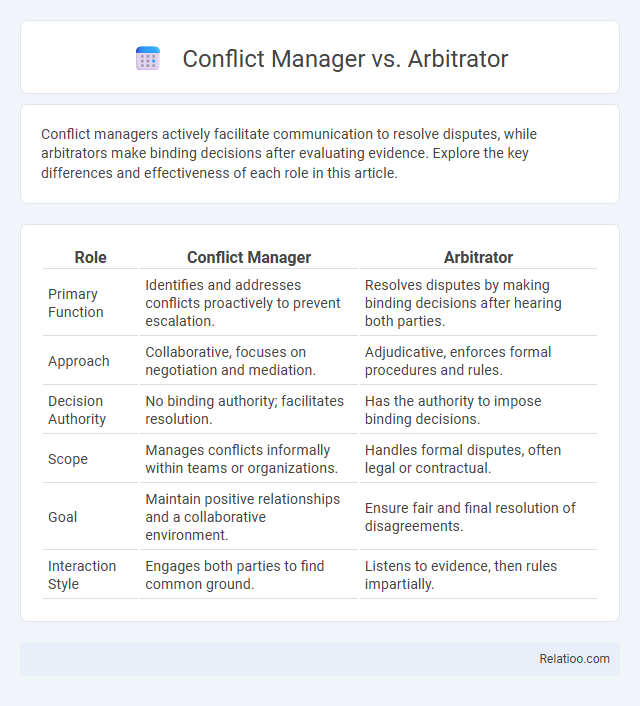Conflict managers actively facilitate communication to resolve disputes, while arbitrators make binding decisions after evaluating evidence. Explore the key differences and effectiveness of each role in this article.
Table of Comparison
| Role | Conflict Manager | Arbitrator |
|---|---|---|
| Primary Function | Identifies and addresses conflicts proactively to prevent escalation. | Resolves disputes by making binding decisions after hearing both parties. |
| Approach | Collaborative, focuses on negotiation and mediation. | Adjudicative, enforces formal procedures and rules. |
| Decision Authority | No binding authority; facilitates resolution. | Has the authority to impose binding decisions. |
| Scope | Manages conflicts informally within teams or organizations. | Handles formal disputes, often legal or contractual. |
| Goal | Maintain positive relationships and a collaborative environment. | Ensure fair and final resolution of disagreements. |
| Interaction Style | Engages both parties to find common ground. | Listens to evidence, then rules impartially. |
Introduction to Conflict Management and Arbitration
Conflict management involves identifying and addressing disputes to prevent escalation and promote resolution, often utilizing conflict managers who facilitate communication and negotiation among parties. Arbitrators serve as neutral third parties in arbitration, making binding decisions based on evidence and arguments presented, providing a formal alternative to litigation. Understanding the distinct roles of conflict managers, who emphasize collaborative resolution, and arbitrators, who render final judgments, is essential for effective dispute resolution strategies.
Defining the Role of a Conflict Manager
A conflict manager is responsible for identifying, addressing, and resolving disputes within an organization to maintain a productive work environment. Unlike arbitrators, who make binding decisions based on presented evidence, conflict managers facilitate communication and guide parties toward mutually acceptable solutions without imposing judgments. Your role as a conflict manager involves proactive intervention, mediation, and fostering understanding to prevent conflicts from escalating.
Who is an Arbitrator? Key Responsibilities
An arbitrator is a neutral third party appointed to resolve disputes outside of court through binding decisions. Key responsibilities include reviewing evidence, conducting hearings, and issuing final rulings that are legally enforceable. Unlike a conflict manager who facilitates communication to prevent escalation, the arbitrator's role is to provide an authoritative verdict based on the contractual or legal framework.
Differences in Approach: Conflict Management vs Arbitration
Conflict managers emphasize collaborative problem-solving and maintaining relationships by facilitating open dialogue and negotiation between parties, aiming for mutually acceptable resolutions. Arbitrators adopt a more authoritative approach, acting as impartial decision-makers who evaluate evidence and impose binding rulings to resolve disputes, often in legal or contractual contexts. The key difference lies in conflict management prioritizing voluntary agreements and consensus, while arbitration relies on formal adjudication and finality.
Core Skills of a Conflict Manager
Conflict Managers excel in communication, negotiation, and emotional intelligence to facilitate peaceful resolutions, distinguishing them from Arbitrators who make binding decisions based on evidence presented. Core skills of a Conflict Manager include active listening, empathy, problem-solving, and the ability to mediate between conflicting parties without imposing judgments. Your success in managing disputes hinges on mastering these interpersonal and analytical skills to create mutually acceptable solutions.
Essential Qualities of an Arbitrator
An arbitrator must possess impartiality, strong decision-making skills, and a thorough understanding of legal principles to effectively resolve disputes outside the court system. Unlike conflict managers who facilitate dialogue and mediate ongoing tensions, arbitrators have the authority to render binding decisions based on evidence and legal frameworks. Essential qualities of an arbitrator include neutrality, expertise in relevant laws, clear communication, and the ability to manage procedural fairness throughout the arbitration process.
Situations Best Suited for Conflict Managers
Conflict managers excel in dynamic organizational environments where ongoing relationships require maintenance, handling complex interpersonal issues and preventing disputes from escalating. They are best suited for situations involving continuous collaboration and communication, such as workplace teams or community groups, where proactive conflict resolution preserves harmony. Unlike arbitrators who impose decisions, conflict managers facilitate dialogue and mutual understanding, fostering long-term cooperation.
When to Choose Arbitration Over Conflict Management
Arbitration is preferable when your dispute requires a legally binding resolution enforceable by courts, offering a structured process with a neutral arbitrator making final decisions. Conflict management suits scenarios where preserving relationships and ongoing communication are priorities, focusing on negotiation and mediation without binding outcomes. You should choose arbitration over conflict management when certainty, formality, and finality in resolving conflicts are critical for your business or legal situation.
Benefits and Limitations: Conflict Manager vs Arbitrator
Conflict managers facilitate dialogue and negotiation to resolve disputes, promoting collaborative problem-solving with flexible outcomes; however, their role may lack the finality and enforceability that an arbitrator provides. Arbitrators deliver binding decisions based on evidence and legal standards, ensuring resolution certainty and legal enforceability, but this process can be more formal, costly, and time-consuming. Organizations often prefer conflict managers for ongoing relationship preservation, while arbitrators are ideal for disputes requiring definitive, enforceable outcomes.
Conclusion: Choosing the Right Professional for Dispute Resolution
Selecting the right professional for dispute resolution depends on the nature and complexity of your conflict. A conflict manager specializes in ongoing mediation and prevention strategies, while an arbitrator provides a binding decision after evaluating evidence and arguments. Understanding these distinct roles ensures your conflict is handled efficiently, protecting your interests and fostering resolution.

Infographic: Conflict Manager vs Arbitrator
 relatioo.com
relatioo.com